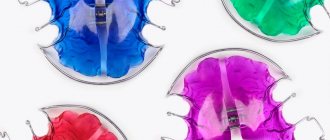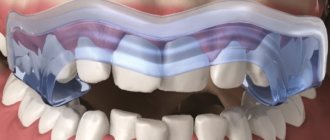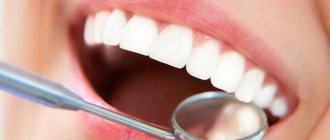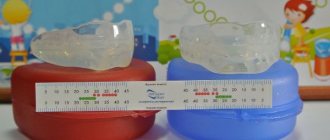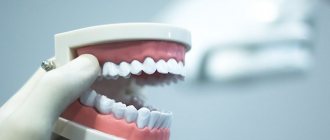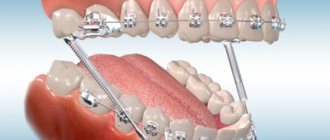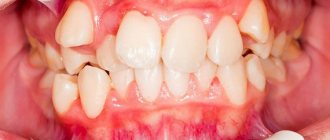Trema - spaces between teeth - are normal in preschool children due to the natural process of growth and replacement of baby teeth. Gaps occur because baby teeth are small and a child's jaw is growing - meaning gaps between teeth are part of the life cycle of a person's teeth.
This is a normal condition for baby teeth.
However, with a permanent dentition this is both an aesthetic and an orthodontic problem.
- The teeth are loosely spaced and do not have sufficient support, so they are more prone to loosening due to the stress of chewing. The risk of gum pockets, exposed tooth necks, and periodontitis increases.
- Food particles get into the teeth and remain there (especially if you don’t brush your teeth well enough), causing the formation of plaque, and then tartar.
- Hard pieces of food can get between your teeth and injure your gums.
- Diction may be impaired, especially for the sounds [c], [w]. Speech will become whistling.
Therefore, as with other defects in the location of teeth, there is a rule: first of all, this is a violation that requires treatment, and only then an aesthetic defect.
Several reasons for the formation of three
- Partial edentia. If some teeth are missing, the extra space in the row of teeth causes teeth to appear. The most common congenital absence of the second incisors in the upper jaw, then fangs are pulled in their place. Due to the difference in shape, these teeth cannot touch tightly, so there are almost always gaps between them.
In place of incisors - fangs
- Partial loss (removal) of permanent teeth.
- Anomaly in the size and shape of teeth (small teeth) and disturbances in their location.
- Biting tongue, lips. If this habit develops during the development of the permanent dentition, it can cause the teeth to become incorrectly positioned.
- Wide and low attached frenulum of the upper lip. Promotes the appearance of a diastema - a gap between the upper incisors.
Diastema
Tremas and diastemas: what are they and what is the difference?
These concepts have similar meanings: diastema and trema are terms for dental spaces, but the first refers to the distance only between the central incisors, most often the upper ones. It happens that a person has only a diastema, and there is no space between the teeth in other parts of the jaw. Often movie stars and other public figures consider this their “highlight”.
Fix three
The treatment plan depends on which malocclusion the three are combined with: for example, an open bite is a fairly serious pathology, and its correction takes up to a year and a half.
It is impossible to correct only trema, as this will lead to even greater disruption of the contacts between the teeth, so it is necessary to carry out complex treatment.
Doctors do not recommend eliminating trema using veneers or dental restoration. In fact, this is only concealing the disorder, and not treating it - all associated problems will remain and continue to get worse.
Are aligners suitable?
In most cases, clear aligners are suitable for correcting malocclusion, so they can be chosen as an alternative to braces.
The result of treatment with Star Smile aligners can be simulated and seen using 3D visualization on a computer. Here's an example of what it looks like:
Thanks to such visualization, it is clearly visible what result can be achieved, and the treatment period is also known in advance.
The trems themselves contract very quickly. Therefore, the duration of treatment depends more on what disorders accompany them.
What problems can it provoke?
Despite their apparent harmlessness, tremors very often have a negative impact on both the functioning of the jaw apparatus and the condition of the entire body.
Among the most common problems caused by this pathology are:
- violation of diction , observed at a large distance, which can reach 5 mm;
- damage to the soft tissues of the oral cavity , as severe pathology often leads to the formation of a deep bite, on the basis of which, in addition, problems with the gastrointestinal tract are formed;
- periodontal tissue diseases. The close contact of adjacent teeth provides periodontal protection in the area of the gingival papillae.
If there is a gap, the gum remains open and is constantly exposed to mechanical stress. As a result of this, an inflamed deep gingival pocket forms around the base, in which infection develops.Often this leads to its loosening and complete loss;
- the development of caries, which often quickly covers the enamel, penetrates the tooth cavity and provokes pulpitis, leading to purulent complications.
A purulent infection often causes diseases of the ENT organs and a decrease in general immunity.
Star Smile offers you a free consultation with an orthodontist to correct three in your city!
And it's not a joke.
The Star Smile company is represented by certified orthodontists in more than 70 cities of Russia and we can offer you a unique opportunity - to simulate your future treatment result in three BEFORE it begins. If you like it, you can decide for yourself which way you want to correct the tremors - with aligners or another alternative method. And do you need to correct the three? Since Star Smile is a leading Russian manufacturer of mouth guards for teeth straightening, our prices for treatment of three teeth are truly the most comfortable for you. And the consultation is free. Would you like us to sign you up for a free consultation on correcting three in your city?
Remedies
Photo: how to remove cracks between teeth
In order to prevent complications or tooth loss, it is recommended to stop this problem in a timely manner. To do this, you need to visit a dentist who will make an accurate diagnosis and prescribe adequate treatment.
Only pathological trema requires treatment. To eliminate this defect, clinics use two types of techniques: orthodontic and orthopedic.
For one of the three ways to eliminate it, watch the video:
Orthodontic
Orthodontic includes methods aimed at changing the position of teeth and adjusting the length of the jaw arch. For treatment, special removable and non-removable devices are used.
For children under 12 years of age, removable structures are used , which are gentle and highly effective:
- orthodontic plates;
- elastopositioners;
- aligners, correcting arches.
The choice of device is made only by the dentist, based on individual anatomical and physiological characteristics.
Fixed devices are used in children over 12 years of age and adults . Braces serve as a permanent structure.
Now, any clinic can offer various types of braces, differing in the type of fastening, material of manufacture, principle of corrective action and cost.
Regardless of the orthodontic method, it will take quite a long time to eliminate this defect.
If small gaps form, the result can be obtained in 6–8 months. In the presence of more severe pathology, treatment may take up to 1.5 years.
Orthopedic
Orthopedic treatment is aimed at visually eliminating the problem using corrective agents.
To eliminate the defect, they most often use:
- Ceramic onlays (veneers, lumineers).
They are thin plates that are used to cover the front surface of the enamel. Used with small interdental distances of up to 3 mm. Installing veneers has a small drawback - preliminary preparation of the tooth. - Restoration with a composite is the most budget option.
The technology is similar to installing veneers, but instead of ceramic plates, composite onlays are used. It has a number of disadvantages: it also requires minimal preparation, low aesthetic properties and a short service life due to the softness of the material. - Crowns .
In case of pronounced gaps, the defect is eliminated with the help of crowns, for which a material is used that accurately conveys the transparency and shade of a natural tooth. Using this method, you can hide scars located throughout the entire dentition. Its disadvantages: deep grinding of the enamel and killing of the nerve, even with a healthy tooth. - Implantation .
It is used if the cause of the defect is partial absence of teeth. The procedure has a lot of contraindications and should be carried out only after a thorough examination.
How does diastema of the upper teeth differ from similar pathologies?
In a separate article we will find out what an orthodontist treats.
Follow the link https://orto-info.ru/sistemyi-vyiravnivaniya-zubov/lechebno-profilakticheskie-apparatyi/treyneryi-dlya-tsena-na-razlichnyie-vidyi.html we will look at how much dental trainers cost and what affects this index.
Preventing gaps between teeth
In order to reduce the risk of trema and diastema to a minimum, the following recommendations should be followed:
- Consult a pediatric dentist-surgeon in a timely manner, assess the condition of the frenulum and decide on the advisability of their plastic surgery. It is important to do this long before teeth appear, since improper attachment of the frenulum negatively affects not only the formation of the dentition.
- Monitor the child for bad habits (finger sucking, pencil sucking, etc.) and eliminate them in a timely manner.
- Regularly undergo preventive examinations with dentists in order to timely detect malocclusions.
In the treatment of caries, as well as in dental prosthetics, a competent approach to the issue of maintaining/creating a contact point between the teeth. To do this, when filling defects on contact surfaces, use contour matrices that form fillings with the restoration of tight contact between the teeth.
After filling the defect, the filling material will fit tightly to the adjacent tooth.
How to prevent the development of anomalies in children
The problem is easier to prevent than to treat. Therefore, prevention of gaps should begin in childhood. It is necessary to prevent the formation in children of such bad habits as sucking fingers, toys, and other objects, as well as biting nails, pencils, and pens.
It is important to teach your child to properly and thoroughly care for his mouth. This will help avoid the development of caries or periodontal diseases, such as periodontitis and periodontal disease, which can subsequently cause early tooth loss.
Sources
- https://mnogozubov.ru/diastemy-i-tremy/
- https://ZubNeBoley.ru/lechenie/lechenie-tremy-zubov/
- https://anZub.ru/esteticheskaya-stomatologiya/shheli-mezhdu-zubami-diastema-i-tremy/
- https://TvoiBreketi.ru/patologii/tremy-i-diastemy.html
- https://gidzubov.ru/zabolevaniya/trema-zubov.html
- https://orto-info.ru/zubocheliustnye-anomalii/zubov/polozheniya/tremyi.html
- https://zubovv.ru/ortodontiya/diastemyi-i-tremyi/opasnyi-li-i-kak-izbavitsya.html
Surgical plastic surgery
For many patients, the determining factor in choosing a method for eliminating diastema is the cost of therapy. Be sure to consider your financial resources when you and your doctor select a method for correcting a dental gap. Choose the method that suits you best, but do not skimp on your health, as otherwise you may not achieve what you want and spend even more money on eliminating the negative consequences of unsuccessful treatment.
A tooth gap can also be removed using surgical plastic surgery. This technique involves installing dental crowns. Dentists correct the defect by placing ceramic veneers or crowns on the front teeth. This intervention allows you to achieve an excellent aesthetic effect that lasts for many years. Some disadvantage of this technique is its rather high price.
If for one reason or another you cannot use this technique, the doctor can fill the front teeth for corrective purposes, as a result of which the gap will be eliminated. Pay attention to the above method if the diastema occurs a second time or the installation of staples does not bring the desired result.
Symptoms of the disease
Often this pathology is diagnosed in preschool children - in particular, this applies to physiological disorders. This is due to the active growth of the jaws, characteristic of this age. If a patient is diagnosed with congenital adentia, the teeth will most likely be located in the area between the central incisor and the canine - this is caused by the absence of the lateral incisor rudiment.
If the patient has a lateral impacted canine, the trema is located between the first premolars and the lateral incisors. If the patient suffers from progeny, due to the large and massive lower jaw, the jaws are located between the lower teeth.
Gaps between teeth: why they occur and how to cure them
Currently, dental clinics provide a wide range of services to improve the aesthetics of a smile. Using modern technologies, specialists carry out high-quality whitening, installation of veneers, and restoration of missing teeth through prosthetics. For patients who contact a specialist with pathologies such as diastema or trema (also called “gaps between teeth”), there are also several treatment options. From today's article you can learn in detail about the differences between these pathologies and how to correct them.
